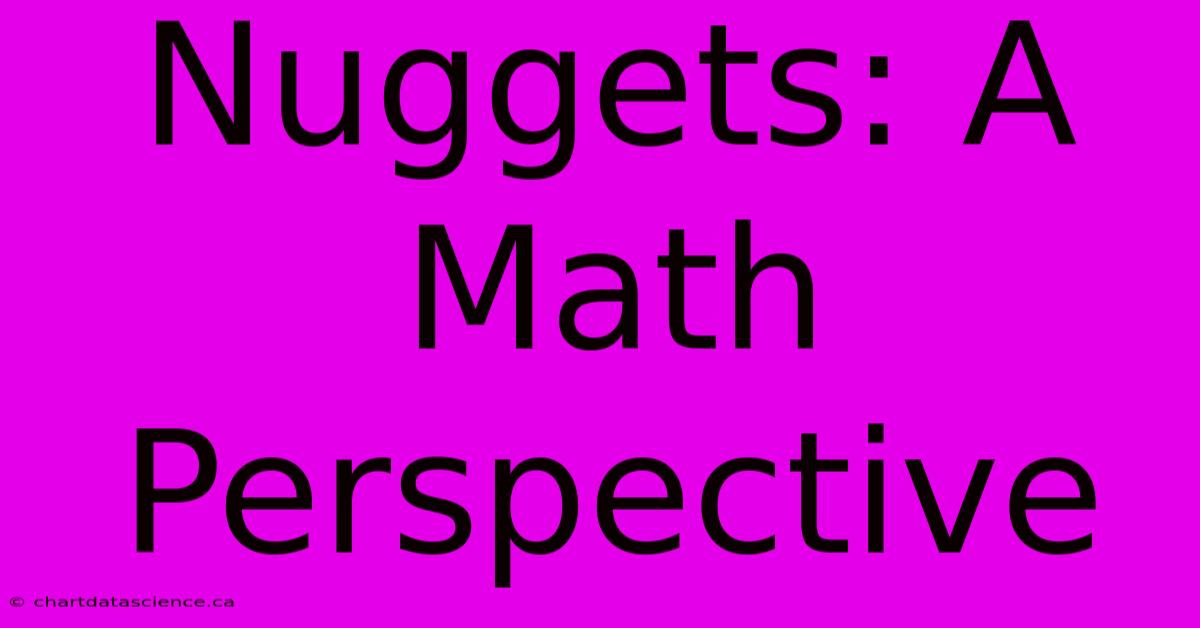Nuggets: A Math Perspective

Discover more detailed and exciting information on our website. Click the link below to start your adventure: Visit My Website. Don't miss out!
Table of Contents
Nuggets: A Math Perspective
Chicken McNuggets. A seemingly simple fast-food item, yet hiding within its crispy, salty exterior lies a fascinating mathematical problem known as the Frobenius Coin Problem, also called the Coin Problem or the McNugget Problem. This article explores the mathematics behind determining the largest number of McNuggets you cannot buy given specific package sizes.
The McNugget Problem: A Delicious Dilemma
The classic McNugget problem usually involves packages of 6, 9, and 20 McNuggets. The question: What's the largest number of McNuggets you can't buy using only combinations of these package sizes? This seemingly simple problem introduces us to some intriguing concepts in number theory.
Understanding the Problem
The core issue is finding the largest integer that cannot be expressed in the form:
6a + 9b + 20c
where 'a', 'b', and 'c' are non-negative integers (meaning they can be 0, 1, 2, and so on). This is a variation of the Frobenius Coin Problem, which deals with finding the largest integer that cannot be written as a non-negative integer combination of two or more relatively prime integers.
Solving the McNugget Problem
Solving the problem requires a bit of mathematical exploration. While there's no single, simple formula for solving the general Frobenius Coin Problem with three or more variables, we can use several approaches to solve the McNugget problem:
Trial and Error (Not Efficient, but Illustrative)
One approach, though inefficient for larger numbers, is to systematically check integers starting from 1. You'll find that you can obtain most numbers, but some will be impossible to achieve using only combinations of 6, 9, and 20.
Using the Greatest Common Divisor (GCD)
The concept of the greatest common divisor (GCD) is crucial. If the GCD of the package sizes is greater than 1, then there will be infinitely many numbers you can't buy. Fortunately, the GCD of 6, 9, and 20 is 1, meaning a solution exists.
Algorithmic Approaches (For More Complex Scenarios)
For more complex versions of the Frobenius Coin Problem (with more package sizes or larger numbers), algorithmic approaches become necessary. These are often computationally intensive and may involve techniques from computational number theory. However, for the classic McNugget problem, trial and error or a systematic approach is usually sufficient.
The Answer and Its Significance
Through trial and error or a more systematic approach, you'll find the largest number of McNuggets you can't buy is 43. Any number larger than 43 can be expressed as a combination of 6, 9, and 20.
Beyond McNuggets: Applications of the Frobenius Coin Problem
The Frobenius Coin Problem, though initially framed in the context of fast food, has surprising applications in various fields:
- Scheduling and Optimization: Determining optimal schedules or resource allocation.
- Cryptography: Related to finding solutions in modular arithmetic.
- Computer Science: In algorithm design and complexity analysis.
The seemingly simple question of how many McNuggets you can't buy reveals a fascinating mathematical problem with connections to diverse areas of study. It's a great example of how everyday problems can lead to rich mathematical explorations.

Thank you for visiting our website wich cover about Nuggets: A Math Perspective. We hope the information provided has been useful to you. Feel free to contact us if you have any questions or need further assistance. See you next time and dont miss to bookmark.
Also read the following articles
| Article Title | Date |
|---|---|
| He Cant Be Stopped Teens Gout Run | Dec 06, 2024 |
| India Vs Australia 2nd Test Stumps Report | Dec 06, 2024 |
| Sydney Train Delays Afternoon Peak Travel | Dec 06, 2024 |
| Black Doves Filming Locations A Look | Dec 06, 2024 |
| Toronto Tempo New Wnba Team Name Leaked | Dec 06, 2024 |
